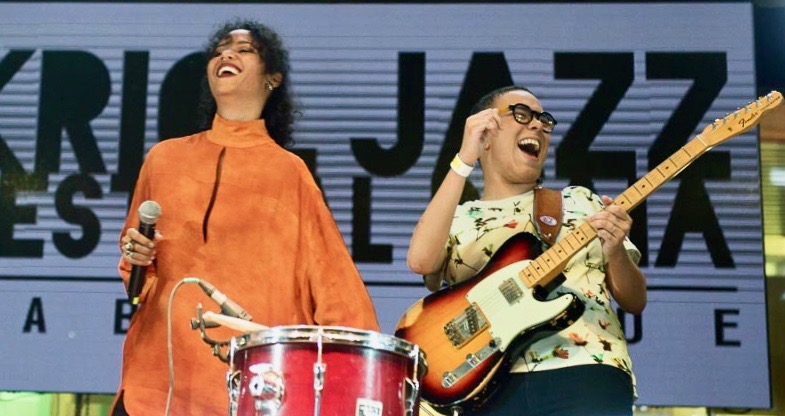Although Cape Verde is a small country with only 500,000 inhabitants, this West African archipelago is home to many musicians and varied music styles. The 10 volcanic islands that comprise this nation, located roughly 500 kilometers off the west coast of Africa, are the birthplace of great artists such as Cesária Évora, Lura, Nancy Vieira and Elida Almeida. Showing the musical fertility of the islands and connecting Creole culture worldwide is the main focus of the Atlantic Music Expo (AME), a vibrant annual music fair featuring conferences and concerts that attracts musicians and industry professionals from across the globe. This year’s fifth edition was held in early April, followed immediately by the ninth edition of the Kriol Jazz Festival.
The beautiful island of Santiago, the most African of the archipelago, sits at the axis of three continents, so it was the perfect setting for the Atlantic Music Expo. The lively event was held in Praia, the Cape Verdean capital, a very laid-back city which offers an interesting mix of Creole culture and evidence of the ancient Portuguese colonial power.
[caption id="attachment_36647" align="aligncenter" width="600"] Dancing in the streets, Atlantic Music Expo.[/caption]
Dancing in the streets, Atlantic Music Expo.[/caption]
Cape Verdean history is closely linked to the transatlantic slave trade. For centuries the Portuguese rulers used Santiago as a hub for African slaves being shipped to the Americas. Independent since 1975, Cape Verde is committed to being at the forefront of positive exchanges; a central point for spreading the vision of creolization (at the heart of the Cape Verdean identity); and to keeping peace in the region. “We are all Creole,” the former minister of Culture, Mário Lúcio, stated at the first edition of the AME in 2013. The majority of the population of the Cape Verdean peninsula has Creole roots, sharing European and African ancestry. Portuguese is used in official situations but in everyday usage Cape Verdeans speak their own creole, one of the oldest versions of creole in the world. The cordial way Cape Verdeans greet you is truly memorable: Tudu dretu? which means “Everything O.K.?” Your answer is Tudu dretu, a colorful expression to start your day.
The Atlantic Music Expo, which drew around 500 local and international delegates from some 30 countries, was established by the Ministry of Culture of Cape Verde and is produced by Harmonia (label, distribution and event production). The expo was welcomed by UNESCO to boost the music industry across the Atlantic Ocean.
[caption id="attachment_36646" align="aligncenter" width="580"]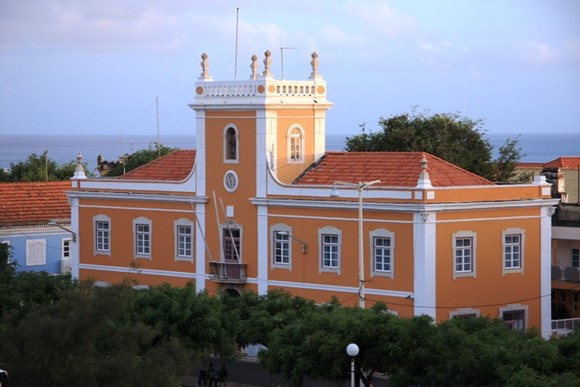 Photos by Youri Lenquette.[/caption]
Photos by Youri Lenquette.[/caption]
The heart of the AME was the Palácio da Cultura Ildo Lobo, a beautiful old colonial building on the Plateau, the center of Praia. Although the program was crammed with conferences, workshops, speed dates and showcases, the mood was relaxed and open: the perfect circumstances in which to do business, share ideas and meet new, inspiring colleagues from all over the globe.
[caption id="attachment_36637" align="aligncenter" width="600"]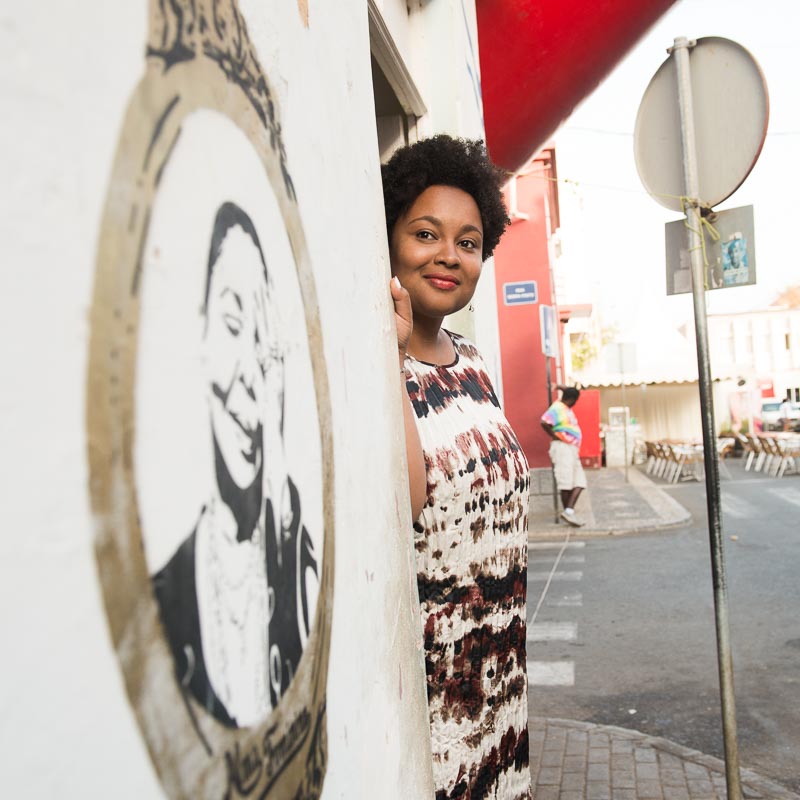 Lucibela, Atlantic Music Expo.[/caption]
Lucibela, Atlantic Music Expo.[/caption]
Daytime was restricted to professionals, who were treated to good music. One of the revelations was Lucibela, a young Cape Verdean singer with an impressive, warm voice and charming stage presence. Her songs were quite reminiscent of Cesária Évora, the world-famous Cape Verdean diva who passed away in December 2011. When I remarked to one of the delegates about Lucibela being the new Cesária Évora, he replied a bit cynically: “Yes, but who needs a new Cesária Évora?’
[caption id="attachment_36632" align="aligncenter" width="600"]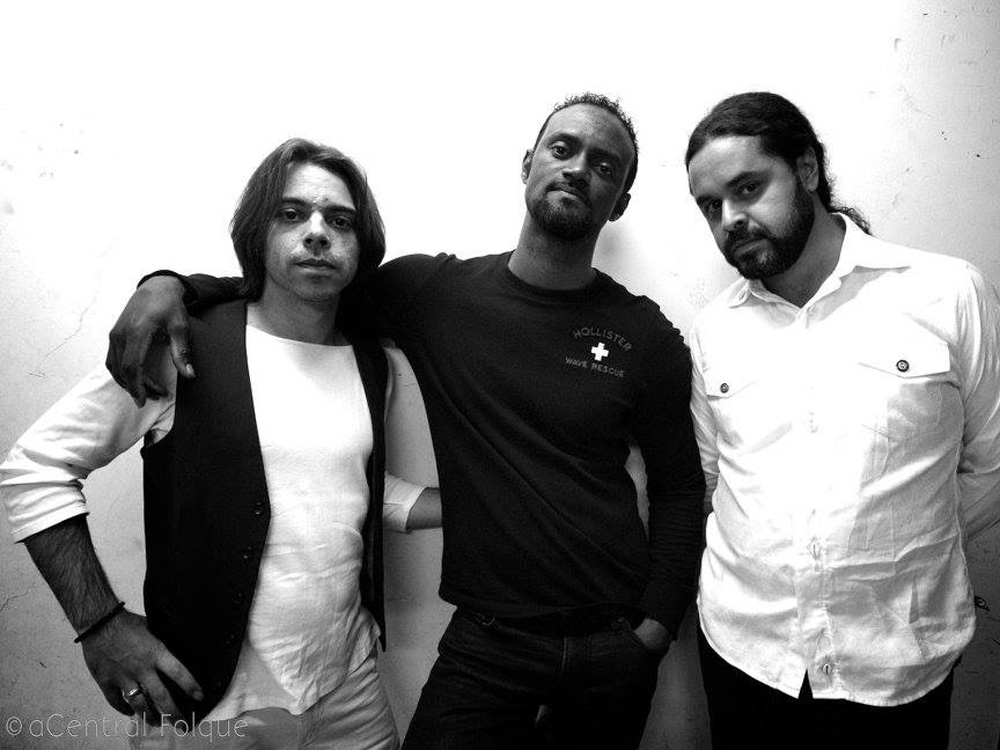 Coladera[/caption]
Coladera[/caption]
The trio Coladera brings together guitarist/singer Vitor Santana from Brazil, guitarist João Pires (Portugal), and the fabulous Cape Verdean percussionist Miroca Paris, nephew of the famous singer Tito Paris. Their refined blend of acoustic Brazilian samba and candomblé, Cape Verdean morna and coladeira, and Iberic fado and flamenco was the perfect mix for a hot afternoon in Cape Verde.
Another intercultural showcase was performed by a trio consisting of percussionist Silvano Sanches, the excellent Malian guitarist Samba Diabaté, and Swiss multi-instrumentalist Vincent Zanetti. In their fascinating set, these three musicians fused traditional Cape Verdean and African rhythms. Diabaté is one of the best Malian guitarists at the moment, playing in the great tradition of such other Malian guitar masters as Djelimady Tounkara (Rail Band) and Ali Farka Touré. What a joy hear to hear these skillful musicians playing together, showing respect for the culture of their fellow musicians.
[caption id="attachment_36635" align="aligncenter" width="600"]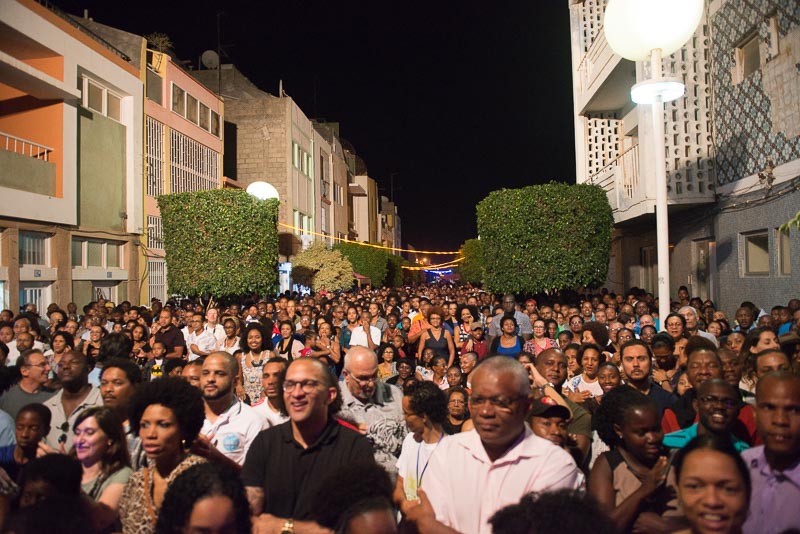 Praia audience, Atlantic Music Expo.[/caption]
Praia audience, Atlantic Music Expo.[/caption]
The night’s open-air showcases on Praça Luis Camões and in the pedestrian area of Praia were open to the enthusiastic public. Headliners on the opening night were the fantastic Spanish harmonica player Antonio Serrano, the alternative Portuguese rock band Dead Combo, and the legendary Cape Verdean band Bulimundo. In the 1980s Bulimundo was very successful in blending traditional funaná music with Western pop styles and instruments.
Besides the emotive, sonorous morna ballads, made popular worldwide by the late barefoot diva Cesária Évora, the archipelago has another, lesser-known fascinating music style, funaná. When the Cape Verdean islands were still a Portuguese colony, this upbeat accordion-based style, developed by descendants of African slaves on the island of Santiago, was banned for being “too wild” and “too African.” It was not until after Cape Verde’s independence in 1975 that funaná began to spread. The high-tempo dance rhythms gave Cape Verdeans space to express their frustrations, worries and sorrows but also their happiness and hope for a better future.
[caption id="attachment_36643" align="aligncenter" width="601"]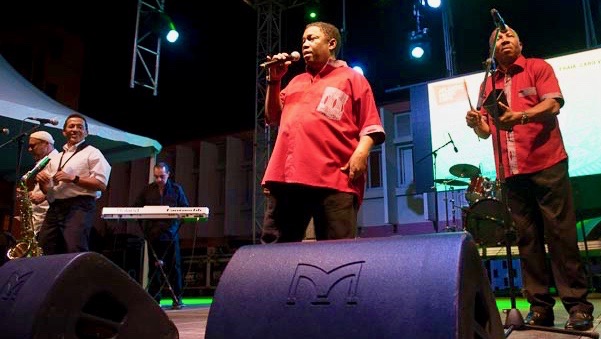 Bulimundo, Atlantic Music Expo.[/caption]
Bulimundo, Atlantic Music Expo.[/caption]
Originally the diatonic accordion (gaita) was accompanied by just a ferro or ferrinho ( metal scraper), producing fast rhythms with a very strong West African imprint. Texts were often about everyday life and special events, laced with double entendre and allusions. Playing funaná on electric and electronic instruments caused a musical revolution in the traditional Cape Verdean music world. Thanks to the success of Bulimundo, funaná was exported to all the islands in Cape Verde and Europe. No longer seen as a genre exclusively from Santiago, today funaná is composed, performed and appreciated by people throughout the islands. Bulimundo was in great shape at AME and all their old hits were welcomed with great enthusiasm.
[caption id="attachment_36638" align="aligncenter" width="600"]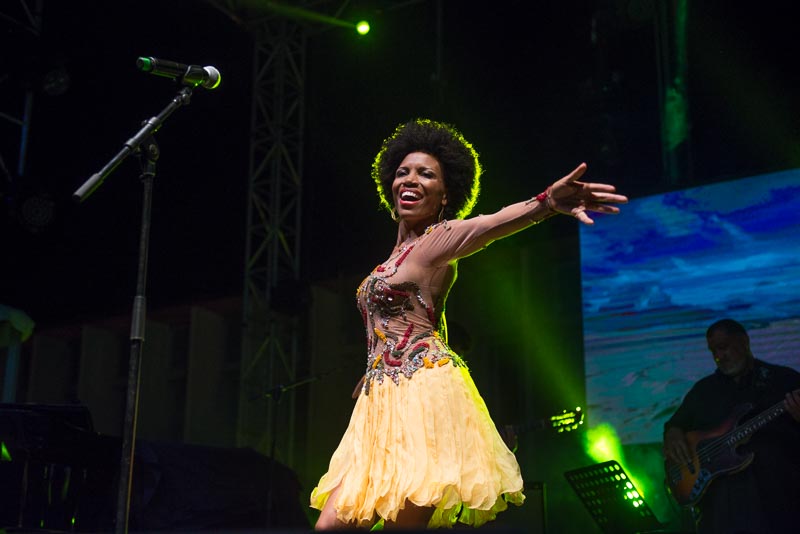 Lura, Atlantic Music Expo.[/caption]
Headliner on the closing night of the AME was the Cape Verdean singer-composer, Lura, With her beautiful, mellow voice, hip-swaying dances and natural elegance, Lura captured the hearts of the audience. Between 2005 and 2009 she released three lovely albums based on traditional Cape Verdean music, adding elements of pop, soul, Brazilian music and jazz. She was considered one of the most talented and charismatic of a new generation of Cape Verdean artists. Then, tired of the music scene, she decided to stop making music for a while,. For six years she didn’t record an album, but she made a comeback in 2015 with the album Herença, on which she re-explores the rich culture of Cape Verde.
Lura, Atlantic Music Expo.[/caption]
Headliner on the closing night of the AME was the Cape Verdean singer-composer, Lura, With her beautiful, mellow voice, hip-swaying dances and natural elegance, Lura captured the hearts of the audience. Between 2005 and 2009 she released three lovely albums based on traditional Cape Verdean music, adding elements of pop, soul, Brazilian music and jazz. She was considered one of the most talented and charismatic of a new generation of Cape Verdean artists. Then, tired of the music scene, she decided to stop making music for a while,. For six years she didn’t record an album, but she made a comeback in 2015 with the album Herença, on which she re-explores the rich culture of Cape Verde.
[Don’t miss Afropop Worldwide’s recent program “We Are All Creole: The Atlantic Sound of Cape Verde.”
The ninth edition of Kriol Jazz Festival was scheduled immediately following the AME and offered three nights of concerts, for which an entrance fee was charged. This attractive festival represents Creole culture worldwide with great jazz musicians, and African and Brazilian stars.
[caption id="attachment_36636" align="aligncenter" width="600"]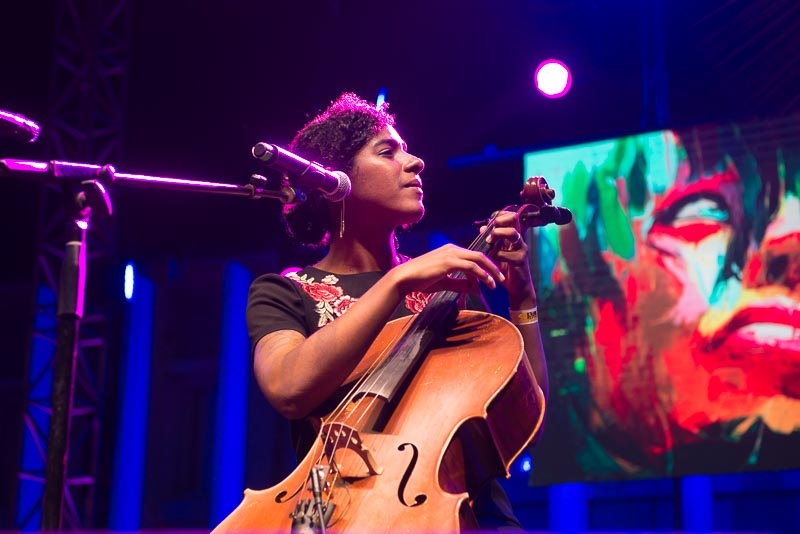 Leyla McCalla, Kriol Jazz Festival.[/caption]
Leyla McCalla, Kriol Jazz Festival.[/caption]
The New Orleans-based Haitian-American Leyla McCalla sings in French, Haitian Creole and English and plays cello, tenor banjo and guitar. Her elegant, intimate songs are influenced by traditional Creole, Cajun and Haitian music, as well as by American jazz and folk. Exploring her Haitian and American identities, McCalla made a huge impression with her great show.
The Brazilian singer-guitarist Maria Gadú is at the forefront of música popular brasileira ( MPB). She was spotted by Caetano Veloso, who once said "Maria Gadú is a popular phenomenon for her own generation and someone with an authentic musical vocation. The first time I saw her I was dazzled, and when she started singing it was spectacular."
With powerful pop and rock numbers Maria Gadú showed she is a very original and surprising Brazilian superstar, blessed with a unique voice. Her duet with the Cape Verdean singer Mayra Andrade, pictured above, was a memorable moment.
[caption id="attachment_36645" align="aligncenter" width="534"]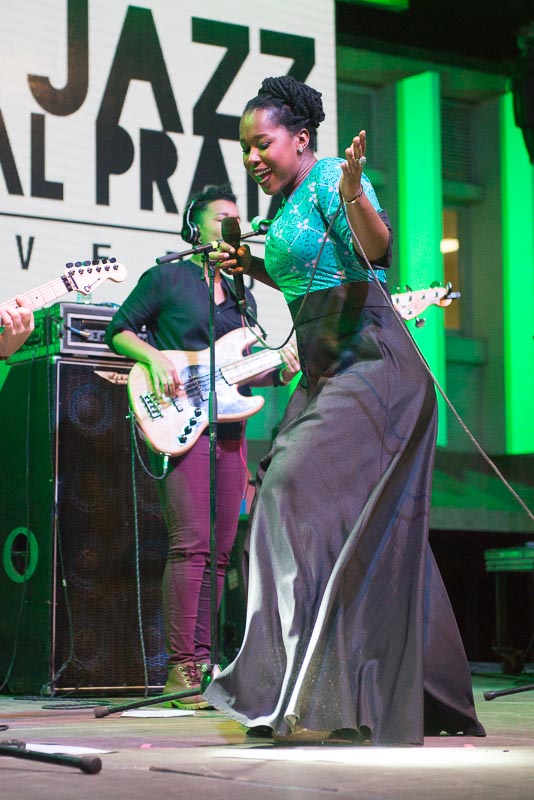 Elida Almeida, Kriol Jazz Festival.[/caption]
Elida Almeida, Kriol Jazz Festival.[/caption]
The closing night of Kriol Jazz kicked off with a new Cape Verdean star, the 24-year-old singer-songwriter Elida Almeida. She was born in Pedra Badejo in the east of Santiago island and spent her childhood years with some difficulty in the mountains of Santiago. At 17, she sang at church and grew up in a place without electricity or utilities. Almeida later performed at local concerts and sang in bars in Cape Verde, where she was discovered by producer José da Silva, Lusafrica’s manager and label owner who presented Cesária Évora to the world.
Elida Almeida’s star has been rising fast, ever since the release of her debut CD Ora Doci, Ora Margos in December 2014. In a very original way she mixes traditional Cape Verdean morna and tabanka rhythms with pop ballads and pan-African styles. Almeida is a very strong, elegant performer who invited the mainly Cape Verdean crowd to sing along. Naturally, everybody in the audience joined her. [Read Alejandro Van Zandt-Escobar’s interview with Elida Almeida here.]
[caption id="attachment_36634" align="aligncenter" width="611"]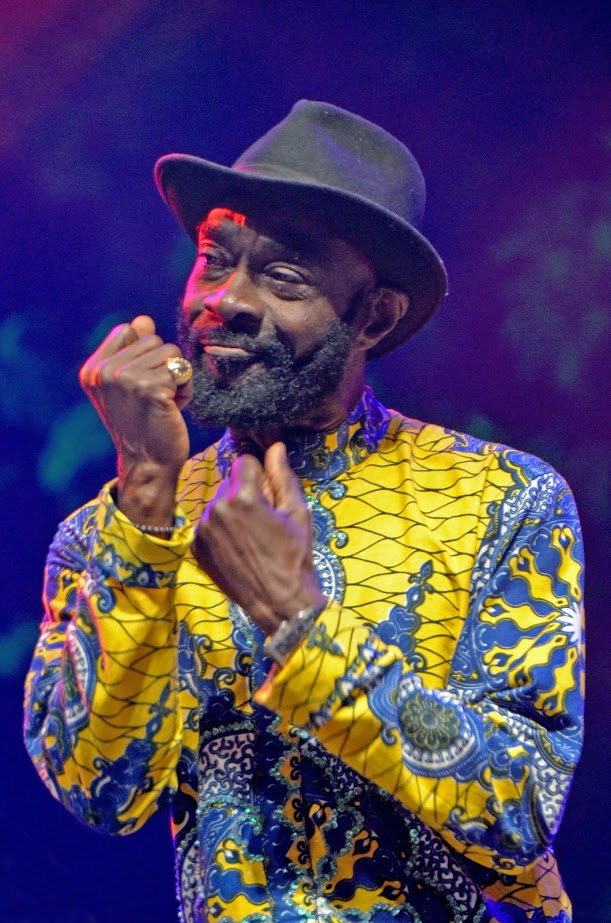 Pat Thomas, Kriol Jazz Festival[/caption]
Ghanaian highlife veteran Pat Thomas and the Kwashibu Area Band was the closing act for Kriol Jazz. The 72-year old Thomas was backed by excellent young musicians on horns, percussion and electric guitars. The ever-energetic Thomas presented a very danceable show, singing songs from his latest album and older hits like “I Need More.” Everybody, including the Minister of Culture and Creative Industries, Abraão Vicente, was dancing like mad. Thomas ended his show at 3 a.m. It was some party! [Read Afropop's interview with Pat Thomas here.]
Pat Thomas, Kriol Jazz Festival[/caption]
Ghanaian highlife veteran Pat Thomas and the Kwashibu Area Band was the closing act for Kriol Jazz. The 72-year old Thomas was backed by excellent young musicians on horns, percussion and electric guitars. The ever-energetic Thomas presented a very danceable show, singing songs from his latest album and older hits like “I Need More.” Everybody, including the Minister of Culture and Creative Industries, Abraão Vicente, was dancing like mad. Thomas ended his show at 3 a.m. It was some party! [Read Afropop's interview with Pat Thomas here.]
With such attractive ingredients as its tropical climate, friendly people, tasty creole cuisine (cachupa), divine drinks (grogue) and inspiring music, Cape Verde is definitely among the most attractive places on earth. Here’s looking forward to next year!
Bastiaan Springer is a producer for Radio 5 (Netherlands), and a world music journalist for FRoots and Songlines.







